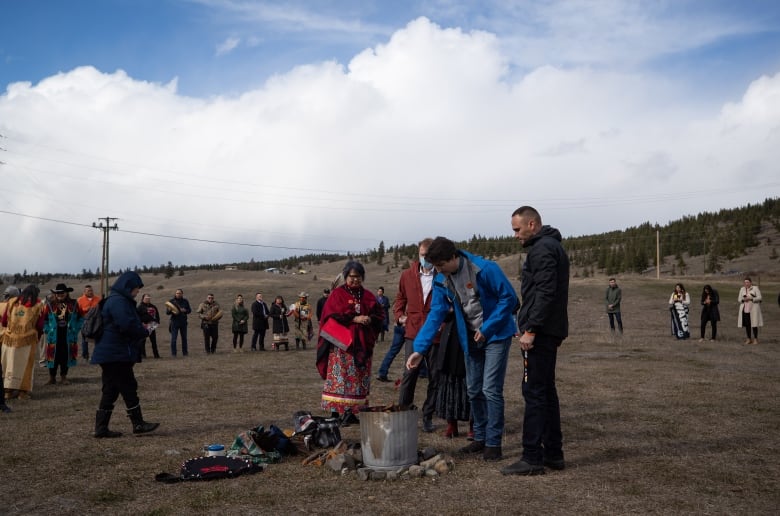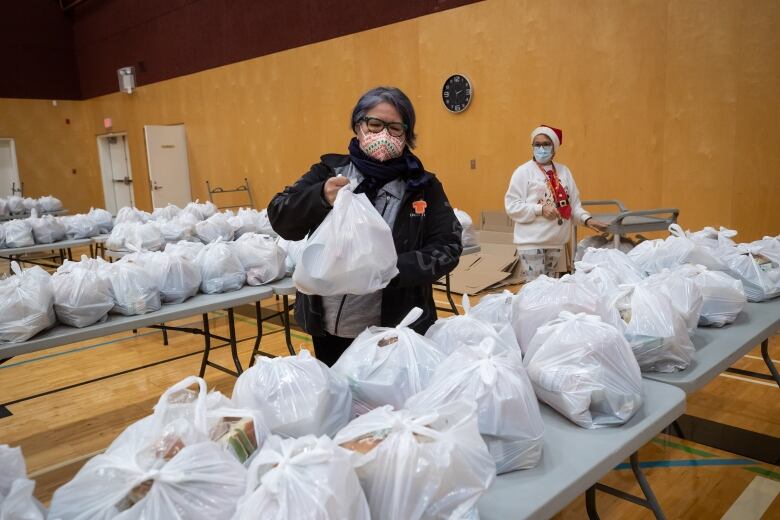Inside the chaos of the Assembly of First Nations national chief’s office
When RoseAnne Archibald staffed her office following her election win last July as the Assembly of First Nations’ first female national chief, it was seen by some working in First Nation politics as a dream career opportunity.
Now, a year into her first term, what was considered a chance to usher in a new era at the Assembly of First Nations (AFN) under female leadership has devolved into workplace turbulence, according to sources who spoke with CBC News.
Archibald faces an external investigation triggered by bullying and harassment complaints from four senior staff members she hired to move to Ottawa and run her national chief’s office.
Three of the four complainants are women, CBC News has learned.
Archibald’s acting chief of staff has filed her own complaint against the four staffers, as well as senior AFN officials, CBC News has also learned.
The internal tensions within Archibald’s office have now plunged the AFN, a national organization advocating for 634 First Nations, into an unprecedented crisis.
Archibald is pitted against the majority of regional chiefs, who suspended her after she made public statements accusing the four staff members of requesting more than $1 million in severance payouts.
The national chief also faces an expected vote of non-confidence at next week’s annual general assembly in Vancouver that could force her out of office — something that has never happened in the history of the organization. Archibald was barred from attending the Vancouver assembly but the AFN reversed that decision, according to an AFN statement sent late Thursday.
CBC News reviewed several documents related to the complaints and interviewed seven sources with direct knowledge of the AFN’s internal workings.
The records and interviews paint the most detailed picture to date of the alleged dysfunction within the national chief’s office.

The complaints allege Archibald required staff to participate in “daily rituals of semi-religious, psychological therapy and psychoanalysis,” and recruited them in schemes against other AFN employees while claiming they were facing “dark forces” aimed at undermining “God’s work.”
CBC News spoke to the seven sources confidentially because they feared workplace reprisal if they were named.
The ‘ultimatum’
Events came to a head in early May when Archibald delivered what a complaint called an “ultimatum” to her most senior staff: get on board with her plan to dismantle part of the organization or get out.
The seven sources also said Archibald was focused on targeting AFN staff she viewed as loyalists to her predecessor, former national chief Perry Bellegarde.
Archibald exhibited “paranoia” toward CEO Janice Ciavaglia, according to records of the complaints.
Ciavaglia was hired by the executive committee during Bellegarde’s last term to oversee the non-political arm of the AFN, known as the secretariat, which has more than 170 employees who focus on policy work.
“She [Archibald] stated that ‘they’ are coming to get her and there are ‘dark forces’ at work within the secretariat so she needs to ‘bring the whole secretariat down,'” read one complaint.
“She said the CEO was behind it, regional chiefs and the entire staff of the secretariat,” the document reads.

Archibald declined an interview Thursday with CBC News to respond to the allegations, which have not been proven.
Her lawyer Aaron Detlor called the accusations “inappropriate and inaccurate.”
CBC News also reached out to Ciavaglia, who did not offer a comment in response.
Complaint accuses national chief of triggering ‘once-buried traumas’
Interviews and complaint records reviewed by CBC News also reveal new details about Archibald’s management style.
In one instance, during an April trip to New York City for meetings with the United Nations, Archibald singled out a staff member and pressed them to reveal the “most traumatic thing” that happened during their childhood, according to one complaint.
The staff member eventually relented but “felt ashamed and ridiculed” after the incident that “triggered once-buried traumas,” the complaint said.
When asked about the complaint by CBC News, Detlor called it “simply false” and “inaccurate.”
“It’s being advanced, as part of a greater agenda, to undermine the national chief,” he said.

Before controversy erupted, sources said Archibald was planning a mandatory two-day “rewilding” retreat for her staff at the end of May, as part of decolonization training, which is mentioned in a complaint.
Archibald planned to hire her personal “sound therapist” to lead the retreat, according to the document.
“The components dealt with personal issues/traumas that had no place being discussed openly with ‘strangers’ and should be a personal choice,” the document reads.
“We were also told that we were ‘damaged’ and needed this training to heal.”
The fallout
Sources said troubles began to escalate within the national chief’s office after Archibald asked her senior staff to help dissolve the secretariat.
This was a significant deviation, sources said, from her election promise to establish “healthy boundaries” between the political and administrative bodies of the AFN, which she accomplished at the Chiefs of Ontario while regional chief.
In an interview with APTN News on June 24, Archibald said the approximately 200 secretariat staff would keep their jobs if the body is dissolved.
But AFN sources said that’s not how Archibald presented her plan to the four senior staffers, who are now on paid leave pending the results of the external investigation.

On May 6, AFN sources said, Archibald held a meeting with her staff, in which she warned them their jobs could be at risk due to the likelihood of a non-confidence vote against her. She encouraged them to consider their options and promised them a reference, according to sources.
In a May 12 email reviewed by CBC News, the four senior staffers asked Archibald to confirm she was “open to negotiating a fair severance package,” including a full payout of the remaining two years of their contracts.
Archibald replied to say their request should be forwarded to the CEO to assist her acting chief of staff, and asked when their last day would be, according to an email viewed by CBC News.
The national chief does not have the authority to approve or decline the proposed severance packages, according to AFN policy. That responsibility falls to the CEO, who must follow the Canada Labour Code.
Nevertheless, Archibald told CTV News and APTN News she refused to authorize such a severance package.
“I felt it was unethical,” Archibald said in a June 24 interview with APTN.
“Our First Nations need clean drinking water. They need good housing. They need me as a national chief to have a healthy work office space with the proper amount of staff so I can start to address those issues,” she told CTV on June 23.

A formal request for the severance payouts was not sent by the complainants, according to sources. They also said any money for severance packages from the national chief’s senior staff would come from her office budget, not money meant for communities.
Before Archibald went public with her allegations, the four senior staff members contacted Archibald after receiving her email reply to say they hadn’t resigned, sources said.
The four senior staff members filed complaints against Archibald shortly afterwards through the AFN’s whistleblower policy because sources said they feared reprisal.
The AFN introduced a whistleblower policy following an earlier investigation into bullying and harassment allegations against Archibald from her time as Ontario regional chief, to allow AFN staff to file complaints confidentially.
(A separate investigation was held into those allegations last year, but none of the complainants wanted to come forward publicly to file formal complaints, so the investigation was ended.)
Archibald fires back
On Wednesday, just days before the Vancouver assembly, Archibald fired back by sharing a 15-page complaint from her acting chief of staff, Joyce Hunter, against the four senior staffers, CEO Ciavaglia and members of the executive committee.
In the complaint filed on June 29, Hunter wrote that she did not see or experience any kind of bullying, intimidation or harassment by Archibald.
She accused one of the four staffers making allegations of yelling at a Dec. 7, 2021 staff huddle because she said they were not satisfied with the content the group prepared for Archibald’s closing comments at the special chiefs assembly.
“After this we came to fear them,” said the complaint shared by Archibald.
Grateful that my family & community of Taykwa Tagamou are standing with me. Our success as a small community has been our relentless pursuit <a href=”https://twitter.com/hashtag/transparency?src=hash&ref_src=twsrc%5Etfw”>#transparency</a> & <a href=”https://twitter.com/hashtag/FinancialAccountability?src=hash&ref_src=twsrc%5Etfw”>#FinancialAccountability</a> for funds that R meant to lift up TTN citizens. <a href=”https://twitter.com/hashtag/AFNForensicAuditNow?src=hash&ref_src=twsrc%5Etfw”>#AFNForensicAuditNow</a><a href=”https://twitter.com/hashtag/AFNInvestigationNow?src=hash&ref_src=twsrc%5Etfw”>#AFNInvestigationNow</a> <a href=”https://t.co/ZuXR9Eheq7″>pic.twitter.com/ZuXR9Eheq7</a>
—@ChiefRoseAnne
Archibald also attached a statement from a former AFN talent acquisition officer alleging favouritism, corruption, unfairness and abuses of staff within the secretariat.
And on June 17, Archibald tweeted part of another whistleblower complaint from an AFN employee accusing the same senior staffers of colluding with the CEO after allegedly hearing one of the staff members speak critically of the national chief to the CEO.
Archibald maintains she is facing backlash for demanding a forensic audit and independent inquiry into the organization’s past eight years.
Algonquins of Pikwakanagan First Nation Chief Wendy Jocko is bringing an emergency resolution to the floor of next week’s assembly calling for an end to Archibald’s “unlawful suspension,” and for a third-party forensic audit and investigation into the climate of “toxicity, corruption, gender discrimination and lateral violence” within the AFN.
Archibald’s lawyer contends her suspension is unlawful.




